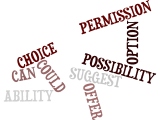Learning how to use can well in English is very important because it is one of the most common words in the English language. As it is a very common word in English as it has many meanings. WHAT'S THE DIFFERENCE? Take a look at the examples below and see the differences in the meaning of can. Example Sentence: I can swim Meaning: I know how to swim (ABILITY). Example Sentence: Can you tell me the time? Meaning: Please, tell me the time (REQUEST). Example Sentence: You can buy a train ticket at the station. Meaning: It is possible to buy a ticket at the train station (POSSIBILITY).
When we talk about how to use CAN in terms of ability, possibility, making a request, we are talking about the function of the word. Indeed, although synonyms of can and could are may and might, you cannot always use the may instead of can in a sentence. In the example used before,
- Example Sentence: I can swim.
- Meaning 1: I know how to swim (ABILITY).
- Meaning 2: I may swim (PERMISSION).
How to use Can – Modal Auxiliary Verb (Function & Use)
Can – Modal Auxiliary Verb (Function & Use)
Study the examples provided below:
Ability
- I can swim.
- Babies can’t talk.
Permission
- Can I go smoke in here?
- You can drive when you are 18 years old in Malta.
Possibility
- Anything can happen.
- I can’t come tomorrow.
Requests
- Can I speak to Jim, please?
- Can you show me the way?
Choices and Options
- You can either smoke in the garden or in the smoking room.
- When you’re 18, you can choose between studying and working.
Offers of Help
- Can I help you?
- Can I take your bags?
Grammar Rules
- Do not use the 3rd person ‘s’ – She can swim.
She cans swim. - Question Form: Can you swim?
Do you can swim? - Use the infinitive of the verb without to after can: I can help you.
I can to help you. - Use can with some verbs that cannot be used in the progressive form. I can hear you.
I am hearing you.
For practice exercises with can click here.

